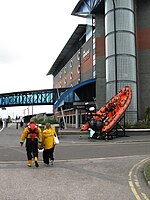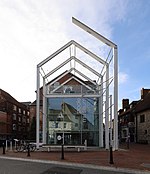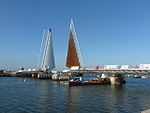1988 Poole explosion
1980s fires in the United Kingdom1988 disasters in the United Kingdom1988 fires1988 industrial disastersChemical plant explosions ... and 7 more
Disasters in DorsetExplosions in 1988Explosions in EnglandFires in EnglandHistory of PooleIndustrial fires and explosions in the United KingdomJune 1988 events in the United Kingdom

On 21 June 1988, a large fire and explosion engulfed the BDH chemical plant in Poole, Dorset, England. 3,500 people were evacuated out of the town centre in the biggest peacetime evacuation the country had seen since World War II. Despite the intensity of the explosion, nobody was killed or seriously injured.
Excerpt from the Wikipedia article 1988 Poole explosion (License: CC BY-SA 3.0, Authors, Images).1988 Poole explosion
Marston Road,
Geographical coordinates (GPS) Address Nearby Places Show on map
Geographical coordinates (GPS)
| Latitude | Longitude |
|---|---|
| N 50.716583333333 ° | E -1.9886666666667 ° |
Address
3rd Poole Sea Scout Group
Marston Road
BH15 1JG , Old Town
England, United Kingdom
Open on Google Maps











